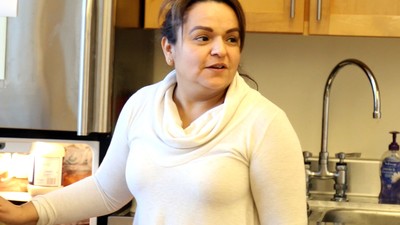“When an alien resides with you in your land, you shall not oppress the alien. The alien who resides with you shall be to you as the citizen among you; you shall love the alien as yourself, for you were aliens in the land of Egypt: I am the Lord your God” (Lev. 19:33–34).
Near the end of a long corridor lined with classrooms and elaborate hand-painted murals of biblical scenes sits a small kitchen. The sign on the refrigerator says, “This is Leonor’s refrigerator. Please do NOT help yourself to her food.”
Standing next to the refrigerator in Forest Hill Presbyterian Church, Leonor Garcia proudly shows off a physical manifestation of the outpouring of love and support she has received from the congregation. She is the sole provider for four children (ages 4–19) as she serves out an as yet undetermined span of self-incarceration. Forest Hill has granted the undocumented Mexican immigrant sanctuary.
Leonor and her five siblings were orphaned at a young age. Her father died suddenly and her mother was forced to move to Mexico City for work. Leonor and her siblings stayed with her grandmother in the Mexican state of Michoacán. Even though her grandmother cared for the children, Leonor struggled without her mother.
When she turned fifteen, her grandmother asked Leonor’s uncle to take care of her in the United States. The move was a positive one for her—she found work that she liked, she fell in love, and she started a family. However, like many undocumented people in the United States, Leonor fell victim to a fraudulent notario who promised she could fix Leonor’s immigration status. Instead, the notario filed incorrectly and left Leonor and her husband with deportation orders
With a month-old infant, Leonor and her husband decided to move and eventually landed in Akron, Ohio. As they tried to make a life for themselves, Leonor had two more children and the young couple purchased a house.
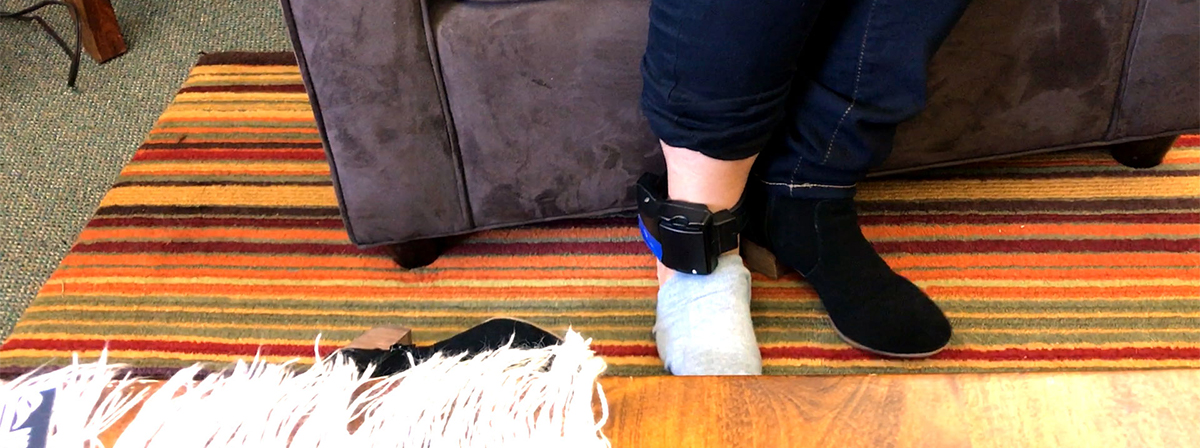
Leonor Garcia shows the ankle bracelet ICE requires her to wear. -Randy Hobson
But in the process of purchasing the home, Immigration and Customs Enforcement (ICE) found Leonor and her family. Her husband was deported and Leonor was given a stay of removal in order to care for her three small children, who, because they were born here, are U.S. citizens.
She began reporting to ICE every three months, then every six months, then once a year. But at her appointment in 2017, everything changed. The ICE officer asked her to report again in six months. Leonor dreaded the appointment … for good reason.
At her next appointment, the ICE agent ordered her to return in mid-September with a plane ticket back to Mexico. They placed an ankle bracelet on her. She knew as she left the appointment that ICE was going to send her back to Mexico after living and building a life in the United States for the past twenty-five years.
Forest Hill Church is a committed anchor of its community that sits among the lush, tree-lined streets of Cleveland Heights ten miles from the busy center of Cleveland. The suburban congregation has a history of missional engagement and outreach. The population of the area is almost equally African American and Caucasian.
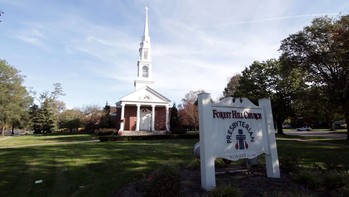
Forest Hill Church in Cleveland Heights, Ohio. —Randy Hobson
Absent a significant migrant population in the community, the congregation nevertheless heard God’s call to migrant welcoming ministries. With no existing relationships, in early 2017 Forest Hill explored its call and formed a subcommittee of their Justice and Mission Ministry to look at what it would mean to become a sanctuary church.
As partnerships were formed and the planning continued, a local activist organization introduced the congregation to Leonor—still living in Akron, where there is a larger immigrant population.
Leonor’s story drove the Forest Hill session to action.
Staff who manage the building and those who would provide for her security and comfort acted quickly. A shower was installed and volunteers organized. With a remarkable effort to make it happen, Leonor settled in an upstairs room—without her children and miles from her Akron home—just days before she was to be deported in mid-September.
Leonor and Forest Hill Church receive support from the local interfaith community. So many congregations and organizations have called the church offices to offer encouragement that the church’s pastor, John Lentz, cannot recount them all. Cleveland Heights’ mayor, council members, and chief of police are among the many local leaders who have contacted the church to voice their support.
What goes on inside these walls also has to reflect what we want to witness to in the world.” - Pr. John Lentz (4:41)
Leonor, an established community advocate in Akron, has been deeply involved in advocating for migrant rights and helping migrants connect with services and other organizations. She knew sanctuary was an option to keep her family and other families together. When Leonor ponders life in Mexico, she can’t imagine taking her children there—a country her children do not know and she has not seen in twenty-five years.
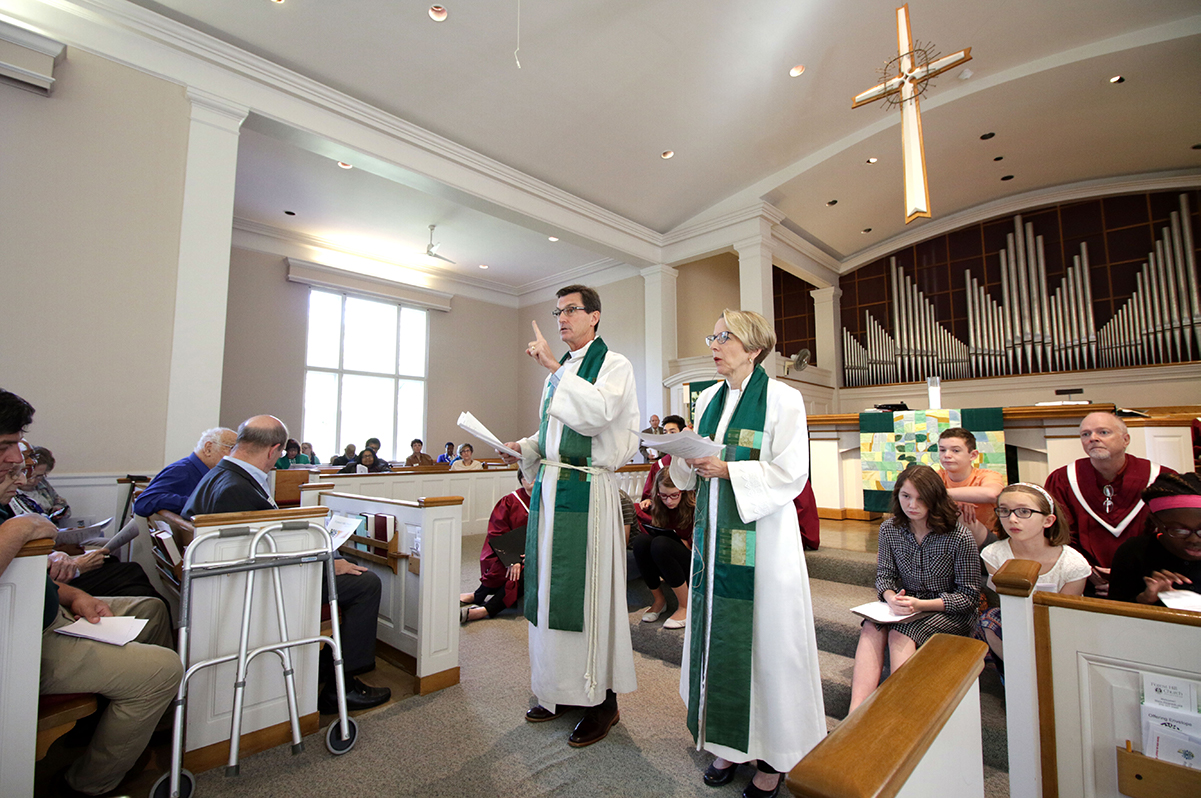
Forest Hill Church senior pastor, Rev. Dr. John Lentz, and associate pastor, Rev. Lois Annich make announcements during worship service. -Randy Hobson
Instead she has chosen to fight to stay with her family and enter sanctuary. Leonor describes her decision as heart-wrenching. As she walked into the church building knowing she could not leave and her family could not live with her there, she said she “felt as if her skin was peeled away.”
She’s lost so much—caring for and being with her family on a daily basis, helping the Akron community she loves, and her own freedom of movement—but she considers her decision a form of resistance. Leonor is clear in her belief that U.S. immigration laws and enforcement are unfair, splitting up families, forcing them to live in constant fear, and pushing them to the margins. Her choice is about standing up to that system. She asked that others do the same. And Leonor feels the support—from her family, from the church, and even from strangers.
Though she cannot know her future, Leonor fully intends to remain in the U.S. with her family and to maintain the relationships she now has with the members of Forest Hill Church. Needing to remain active in her new church home, she took on the work of regularly cleaning the church sanctuary saying, “the sanctuary is mine, it is mine to clean. And I have told them that when I leave the church I will continue to clean and take care of the sanctuary.”
This work of resistance and justice-seeking happens in community. The 222nd General Assembly (2016) stated in the resolution, Reaffirming the Ministry of Sanctuary by Congregations, that the PC(USA) “reaffirms the ethical responsibility of congregations and governing bodies of the Presbyterian Church (U.S.A.) to defend the unity and integrity of families when an immigrant mother or father is threatened with deportation” (Minutes, 2016, Part I, p. 944 of the electronic file, Item 12-11).
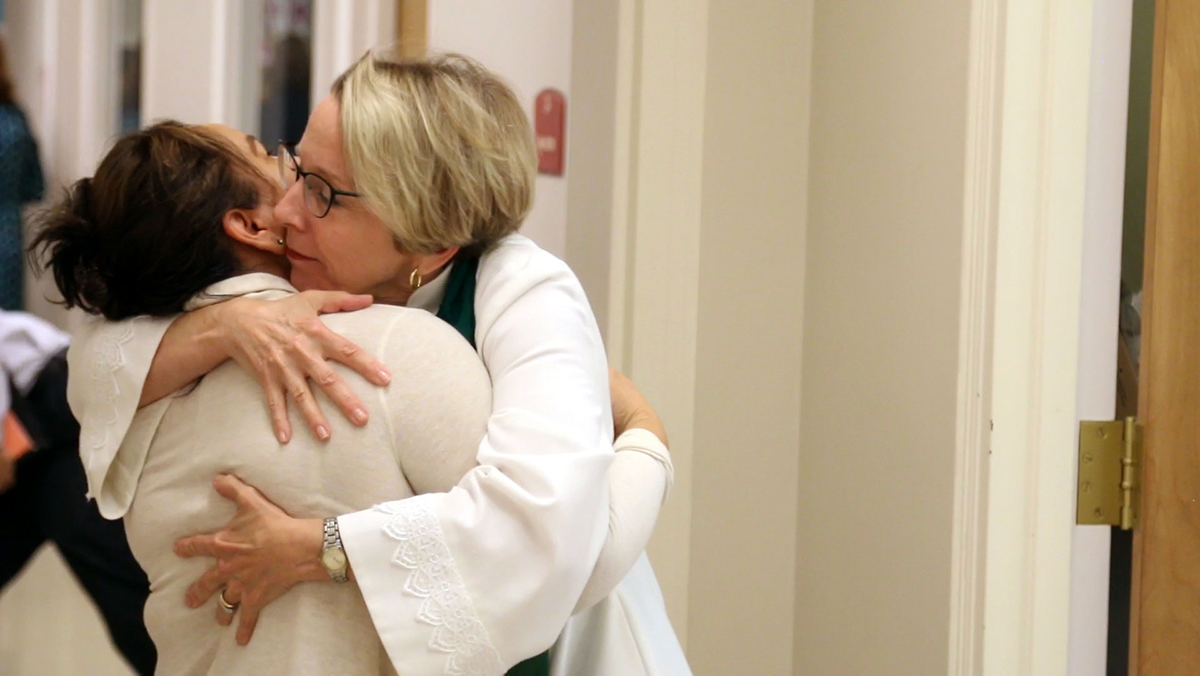
Forest Hill Church associate pastor, Rev. Lois Annich, and Leonor Garcia embrace prior to Sunday worship. -Randy Hobson
Religious people of all backgrounds across the country are offering sanctuary. More than 100 cases are known to exist. Although there is no legal basis for immigration agents to respect sanctuary, there is a current policy in place that allows it to be an effective witness.
ICE spokesperson, Khaalid Walls, states, “Current ICE policy directs agency personnel to avoid conducting enforcement activities at sensitive locations unless they have prior approval from an appropriate supervisory official or in the event of exigent circumstances. The locations specified in the guidance include schools, places of worship, and hospitals.”
Read more about sanctuary, family care plans, and accompaniment.

